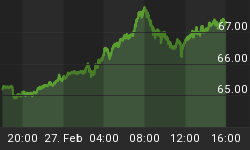Thus far in 2014, April ended on schedule and May arrived as expected. Well-placed sources, wishing to remain anonymous as they are not at liberty to speak on the matter, suggest that June will also arrive on time. That seems to sum up the only accurate components of the consensus forecast for 2014. As the chart below portrays, just about everything else continues to do the opposite of what was generally expected by the popular seers on the future.

In the above chart are plotted year-to-date returns for several investment measures. Bars on the left, the ones continuing to show significant positive returns, represent the three components of the commodity sector. To the right, using red bars, are what would be commonly referred to as underperforming groups. The term "underperforming" is used by the Street so as not to admit they recommended you load your portfolios with Techno/Junk losers. Oh, and what about the far-right bar for GDX, the ETF for more mature Gold and Silver mining stocks? How could that happen?
Perhaps the reason for the above results is a very simple truism.
When Russians are shooting down helicopters in Eastern Europe, one buys real stuff not paper fantasies.
When the probability of armies shooting at each other in Eastern Europe is a positive value, one buys real stuff. Armies possibly engaging in hostile actions enhances the values of real "stuff". In such an environment one buys Gold, Agri-Food, and oil, all of which have real value. One does not buy popular Techno/Junk paper fantasies.
Might the trends pictured above continue? Yes, is the best answer to that question for many reasons. One of which is a corollary to the investment rule promulgated above.
When adversaries engage in a shooting conflict, that situation is only resolved when one side is exhausted.
Yes, interludes in hostilities may develop, but the overall situation is never resolved by inept diplomacy. Fountain pens are only effective after the differences have been fully resolved on the ground. One would have great difficulty finding a similar situation in history successfully resolved by hot air from politicians and the ink in their pens.
A second reason for the investment results portrayed above is another principal.
When someone is dropping bricks on your head, move.
The Federal Reserve has now dropped the "fourth brick" on the heads of investors. Some, having already recognized the situation for what it is, and have moved out of the Street's Techno/Junk trading on the NASDAQ.
They have remembered the old monetary rule: Three steps and a stumble, two cuts and a jump. The FOMC has tightened monetary policy four times. That situation normally signals the onset of the beginning of a bear market in financial assets. Rationalizing that likelihood may fill time in the business media, but it will likely cost you money. Remember, "moving" out of Techno/Junk into real assets such as Gold and Agri-Foods is still the best defense against falling bricks.
So, will you move, or let bricks continue to pummel your head?
Ned W. Schmidt,CFA is publisher of The Agri-Food Value View, a monthly exploration of the Agri-Food Super Cycle, and The Value View Gold Report, a monthly analysis of the real alternative currency. To contract Ned or to learn more, use either of these links: www.agrifoodvalueview.com or www.valueviewgoldreport.com















